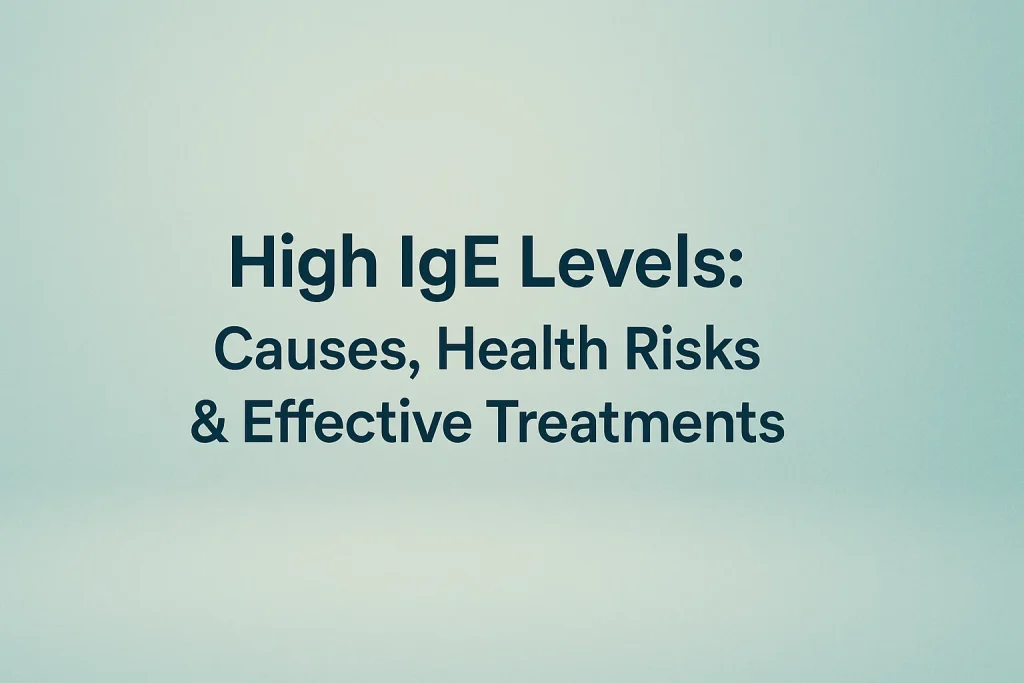
High IgE Levels: Causes, Health Risks & Effective Treatments
Your immune system is meant to protect you, but it can sometimes overreact. A high IgE (Immunoglobulin E) level in your blood is one of the most revealing signs. While IgE is essential for fighting allergens and parasites, abnormally high levels can indicate more serious health issues such as chronic allergies, asthma, or even underlying immune disorders.
In this article, we’ll explain what high IgE levels mean, why they matter, and, most importantly, how to manage them and protect your health.
What is IgE?
IgE, or immunoglobulin E, is one of the antibodies released during hypersensitive allergic reactions as part of the immune response to fight allergens such as pollen, dust, food allergens, and foreign bodies entering our body. Ige can cause symptoms such as sneezing, coughing, and so on. The normal range lies between 200 IU/mL; a level above this indicates a health condition that requires immediate medical attention. Having precise information about the allergic condition allows you to provide the best possible treatment for better recovery.
What are the symptoms of high IgE levels?
A high IgE level does not indicate a symptom; instead, it is a laboratory finding that is associated with an underlying health condition. Here are the symptoms associated with high IgE levels:
Allergy symptoms—the most common cause of high IgE.
- Sneezing
- Runny nose
- Itchy eyes
- Hay Fever
- Skin Rash (Hives, eczema)
- Wheezing
- Difficulty breathing (shortness of breath)
Symptoms of Parasitic Infections
- Fever & Tiredness (fatigue)
- Abdominal pain
- Diarrhea
- Nausea and vomiting
- Frequent Weight Loss
- Anaemic condition (due to blood loss from the parasite)
- Cough (if the parasite reaches the lungs)
- Swollen lymph nodes
Symptoms of Primary Immunodeficiency Disorders
Certain rare genetic disorders with immune-related symptoms may influence IgE levels. Here are some of the symptoms that vary widely depending on the specific disorder.
- Unusual or Recurrent Infections (Pneumonia, skin infections)
- Eczema (severe and persistent)
- Chronic fatigue (due to long-term infection or illness)
- Osteopenia or other bone deformity
- Swollen lymph nodes (due to immune response or infection)
What are the causes of high IgE levels?
The causes may vary depending on the patient’s medical condition. Here are some of the most common causes:
- Hypersensitivity (allergens) – When your immune system mistakenly identifies pollen, dust, or food allergens as an infectious agent, leading to high IgE levels, which helps in neutralizing them. The common symptoms are a runny nose, sneezing, and itchy eyes.
- Parasitic infections—parasites belonging to the classes cestodes and nematodes, such as hookworms or roundworms, can trigger high IgE production during the immune system response.
- Family History—A family genetic history of allergic response can increase your risk of high IgE levels
- Immune system disorders—If your immune system functions abnormally due to a disorder, it may result in conditions such as elevated IgE levels, which cause allergic reactions and have an impact on your overall health.
- Common variable immunodeficiency (CVID): This disorder is more frequently linked to low levels of other immunoglobulins (IgG, IgA, and IgM) and impaired antibody production. In some cases, it may also be linked to elevated IgE levels.
- Other Factors: In rare cases, some drugs, such as antibiotics and anticonvulsants, can cause a type 1 hypersensitivity reaction and temporarily raise IgE levels.
What complications are related to high IgE levels?
- Chronic allergic conditions like asthma, allergic rhinitis, and eczema (primarily associated with high IgE levels)
- Candidiasis(fungal infection)
- Chronic wounds and poor healing
- Hyperimmunoglobulinemia E syndrome (rare HIES can cause skin infections, lung infections, etc.)
- Certain nutritional deficiencies, such as malabsorption or dietary restrictions
What Are Normal IgE Levels in Adults?
Depending on the laboratory conditions, testing method, and the particular unit of measurement employed, the normal value of our body’s IgE level varies. It may also vary based on factors like gender and age group. IgE levels typically fall between 0 and 150 IU/ml. Values above this range may indicate allergic or immune-related conditions.
| IgE Level | Value (IU/mL) | Interpretation |
| Normal IgE Level | 0 – 150 IU/mL | Within normal range |
| Mildly Elevated | 151–300 IU/mL | May indicate an allergic response |
| High IgE Level | >300 IU/mL | Indicates a significant allergy, parasitic infection, or immune disorder |
| Low IgE Level | <2 IU/mL (rare) | May be observed in certain immune deficiencies |
Note: IgE levels help your doctor in understanding your health condition, but they do not by themselves confirm a diagnosis. Always interpret them with your full medical history and symptoms.
What level of IgE is considered abnormally high?
The normal range of IgE levels for adults is 150 to 1000 IU/ml. The IgE levels above the normal range may indicate various health conditions such as asthma and eczema. Abnormally high levels can lead to certain rare immune disorders that require immediate medical attention. Consult with your doctor and immediately get proper treatment.
What if my IgE level is high?
High IgE levels in your body may be due to certain allergic reactions that are normal and go away on their own, but if you have any abnormal symptoms in your body, you can do the following things:
If you experience any unusual symptoms linked to elevated IgE levels, seek medical advice and speak with your physician. Based on your medical condition, your doctor may recommend an IgE test or other additional tests for further testing if the report indicates an abnormal IgE level.
Some additional tests
- Specific IgE Blood Tests (RAST/ImmunoCAP): To determine which allergens (e.g., pollens, dust mites, foods) you are allergic to.
- Skin Prick Tests: A common method for determining which allergens are present.
- Parasite Stool Tests or Blood Tests: Recommended in case of parasitic infection.
- Further Immunological Testing: Specialized tests to assess immune cell function or genetic testing may be required in cases of extremely high IgE or suspected immune disorders.
How to manage high IgE levels?
High IgE levels can be managed by taking medications in combination with good health practices that are supportive of overall health and also help in managing chronic conditions. these include
- Stress management: It is necessary, as it can increase the risk of many allergic and inflammatory conditions.
- Balanced Diet: Include fresh fruits, vegetables, healthy fats, and probiotics that help reduce inflammation linked to high IgE levels and promote overall immune health.
- Frequent exercise: It helps you control asthma symptoms and improve overall health.
- Quality Sleep: vital for the immune system to function.
- Regular health checkup: Regular assessments help in the early detection and treatment of any issues.
How to Treat High IgE Levels?
The only way of treatment aimed at long-term management and control of the specific condition, which in turn helps regulate IgE levels. These are:
- Proper Medication: Adhering to prescribed medication regimens, such as those involving corticosteroids, antihistamines, and biologics like omalizumab for severe allergic asthma, is essential to proper medication.
- Monitor and Screening: Check your condition and, if needed, track your IgE levels by seeing your doctor or specialists (such as an immunologist or allergist) regularly.
- Avoid Triggers: Recognizing and reducing exposure to known irritants or allergens.
Conclusion:
High IgE levels may indicate underlying allergies, parasitic infections, or immune system disorders. While they are not always dangerous on their own, if left untreated, persistently elevated IgE can lead to serious health problems. Effectively manage and safeguard your long-term health by being aware of its causes, knowing its symptoms, and promptly seeking medical advice. Always consult your doctor for an accurate diagnosis and a personalized treatment plan.
FAQs
What is an IgE test?
An IgE test is used to determine the blood’s level of IgE antibodies in order to screen for certain illnesses linked to elevated IgE levels.
What Is a Healthy IgE Range?
IgE levels typically range from 0-150 IU/ml, and they can vary from person to person depending on age and gender.
Can high IgE levels be dangerous?
Adults normally have IgE levels between 0 to 150-200 IU/mL. A higher level could indicate more serious immune system disorders or, in rare instances, allergic conditions like eczema or asthma.
Does low IgE mean higher cancer risk?
Still being researched. The immune system can be compromised in case of very low IgE levels, which could slightly raise the risk of developing some cancers.
Can stress or diet affect IgE levels?
Stress does not directly increase IgE levels, but it can worsen allergy symptoms. Diet may play a role if you’re allergic to certain foods.
What does a low level of IgE show?
A low IgE level (less than 2 IU/mL) may be associated with certain primary immunodeficiencies, which can affect the immune system’s ability to fight infection.
Can high IgE levels be linked to cancer?
Although high IgE levels are primarily linked to allergies, some studies suggest that chronic immune conditions may be linked to some blood cancers like lymphoma or leukaemia.
- Immune Checkpoint Inhibitors: Mechanism, Cancer Types & Side Effects
- Yoga & Meditation for Cancer Recovery: Benefits, Research & Healing Tips







